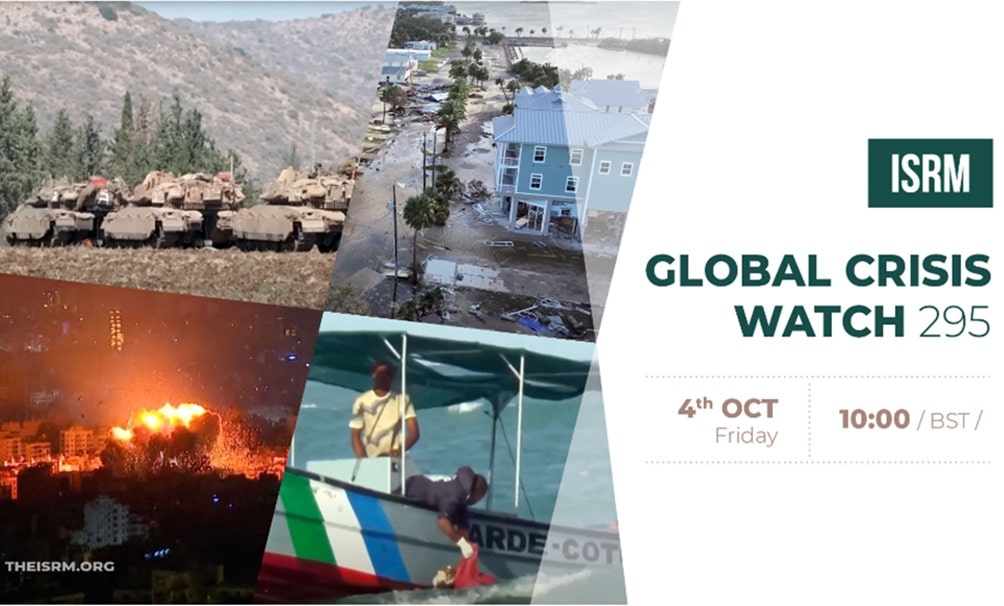The Institute of Strategic Risk Management (ISRM) is inviting security professionals to its latest Global Crisis Watch, number 295, taking place on Friday, October 4 at 10:00 BST.
This week topics will include Israel’s ground offensive in Lebanon escalating tensions in the region, Iran’s missile barrage on Israel, plus the destruction left by Hurricane Helene in the US, and the tragedy that recently unfolded around the coast of Africa following the death of migrants and refugees, coming from Yemen, who were forced into the sea. Read more about the topics below.
Israel’s ground offensive in Lebanon escalates regional tensions
Israel has initiated a ground invasion in southern Lebanon, targeting Hezbollah’s military infrastructure, which it perceives as a direct threat to northern Israeli communities. Described as “limited, localised, and targeted,” the operation follows weeks of escalating airstrikes and warnings to civilians. The Israeli Defense Forces (IDF) have urged residents of 25 Lebanese villages to evacuate, and over a million people are now displaced across Lebanon. Prime Minister Najib Mikati has called this one of the most dangerous periods in the country’s history.
Hezbollah denies Israel’s claim of a ground presence, despite Israeli officials confirming the movement of troops across the border. Israeli Defense Minister Yoav Gallant has emphasized that Israel will use air, sea, and land forces to neutralize Hezbollah’s capabilities. The group, known for its vast tunnel networks and military infrastructure, has warned it is ready for a long confrontation.
The death of Hezbollah’s leader Hassan Nasrallah in an Israeli airstrike last week marks a significant blow to the group. International responses have been mixed, with US President Joe Biden calling for an immediate ceasefire, while the European Union and others urge restraint. Iran, Hezbollah’s main backer, has condemned Israel’s actions but has not directly intervened.
As the conflict intensifies, humanitarian agencies have expressed concern about the growing civilian toll and displacement, calling for urgent international aid to address the worsening crisis.
Iran Unleashes Massive Missile Barrage on Israel Amid Rising Tensions
Iran launched more than 180 ballistic missiles at Israel in a major escalation, heightening fears of a broader regional conflict. The strikes, which included hypersonic missiles, targeted major cities like Tel Aviv and Jerusalem, forcing millions of Israelis into shelters. One person was killed by missile debris in the West Bank. The Islamic Revolutionary Guard Corps claimed the attacks were in retaliation for the killings of Hezbollah and Hamas leaders, Hassan Nasrallah and Ismail Haniyeh. Israeli Prime Minister Benjamin Netanyahu condemned the strikes, calling them a “big mistake” and vowed that Iran would “pay for it.”
Most of the missiles were intercepted by Israel’s air defense systems, supported by U.S. military forces. The Israel Defense Forces (IDF) resumed airstrikes against Hezbollah positions in Beirut in response. UN Secretary-General António Guterres called for an immediate ceasefire to prevent further escalation. The United States, UK, France, and other allies expressed their support for Israel while urging caution.
The missile barrage follows nearly a year of cross-border hostilities between Israel and Hezbollah, driven by the ongoing war with Hamas in Gaza. Experts noted that Iran’s missiles, including advanced Fattah-1 and Kheybarshekan models, posed a more significant threat than previous attacks due to their speed and maneuverability.
Despite the large-scale interception, analysts warn that future attacks could be even more complex and overwhelming for Israel’s defense systems, potentially coordinating ballistic missiles with drone and cruise missile assaults.
Southeast reels from hurricane Helene’s destruction: Over 160 Dead, billions in damage
Hurricane Helene has caused catastrophic damage across the southeastern United States, with the death toll exceeding 160 and rescue operations still underway. North Carolina has been hit hardest, particularly Asheville, where 57 deaths were reported. The state overall has seen 113 fatalities, while South Carolina, Georgia, Florida, Tennessee, and Virginia have also reported significant loss of life. Thousands remain stranded, and more than a million homes and businesses are still without power. President Joe Biden plans to visit the disaster zones to oversee recovery efforts, while former President Donald Trump and Vice President Kamala Harris have also expressed their support.
Helene made landfall in Florida’s Big Bend region as a Category 4 storm before moving north, bringing torrential rain, flash floods, and strong winds across several states. In Asheville, roads are impassable, cutting off communities from essential services. Search and rescue teams are working tirelessly to reach isolated areas. Tennessee faced a potential dam failure due to flooding, prompting the evacuation of residents, though the dams ultimately held.
The economic damage is estimated between $95 billion and $110 billion, with millions affected. Experts point to the record-high water temperatures in the Gulf of Mexico, fueled by climate change, as a factor in the hurricane’s intensity. Recovery efforts are expected to be long and arduous, as communities try to rebuild in the face of widespread destruction and a rising death toll.
Eastern route’s perils: Thousands risk lives for a better future amid growing death toll
Rescuers are searching for over 100 migrants missing off the coast of Djibouti after smugglers forced them to jump into the sea. At least 45 bodies have been recovered, marking 2024 as the deadliest year for sea crossings between East Africa and Yemen, according to the International Organization for Migration (IOM). The two boats, carrying a total of 310 passengers, departed from Yemen, highlighting the dangers faced by many migrants seeking better opportunities in Gulf nations via the Eastern Route – a busy and perilous migration corridor.
Survivors reported that they were compelled to leap into the ocean near Obock, Djibouti, and included a four-month-old infant whose mother drowned. This route has long been exploited by human traffickers, with over 150,000 people, primarily Ethiopians, attempting the dangerous crossing on foot in 2022 alone. Many migrants face violence in Yemen and seek to return to Djibouti, where they often find themselves stranded.
fforts to combat this crisis include a recent mission by the United Nations Office on Drugs and Crime (UNODC) alongside Djiboutian authorities to better understand the conditions migrants endure. Local officials emphasized the need for cooperation to disrupt organized crime networks profiting from human suffering. The joint initiative aims to create a safer environment for migrants by enhancing law enforcement collaboration between Djibouti and Ethiopia.
Plus, all the stories that are catching our attention wherever we live in the world. Feel free to join the ISRM event and add your voice to the conversation.
For more ISRM news, click here





